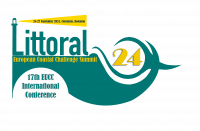TOPICS
Conference Themes
1. Climate change adaptation strategies
Key Topics:
- Sea level rise
- Coastal squeeze
- Climate risks
- Nature-based solutions
The global environmental crisis and climate change affect all ecosystems, but marine and coastal ecosystems are particularly vulnerable because of intensive human activities inside and around these areas.
Given the current challenges of sea level rise, coastal squeeze, and climate risks, the following topics will be addressed: ocean-atmosphere-land interactions; marine and coastal geomorphological processes; dune management; climate change impact and natural hazards adaptation strategies; models to predict future changes under different global change scenarios.
Effectively implemented and managed nature-based solutions contribute to both addressing these challenges and the achievement of marine and coastal areas sustainability.
2. Coastal and marine protected areas and ecosystem services assessment
Key Topics:
- Biodiversity and shoreline habitat losses
- Invasive species
- Marine litter
- Water quality issues
- Over-fishing
The optimal or fair use of marine resources and achieving sustainability require the biological knowledge of diversity and the environment, considering science-based actions to manage those resources.
In the context of biodiversity and shoreline habitat losses, invasive species, marine litter, water quality issues, and over-fishing, best practices in coastal and marine socio-ecological systems and MPAs are aimed to be explored, while considering approaches spanning integrated ecosystem assessments, broader qualitative and quantitative techniques, scenario development and analysis.
Discussions on the processes governing changes in the dynamics of key coastal and marine species, the resilience of ecosystems and resistance of species to past and current changes, as well as the relationships between human activities and environmental impacts, are expected.
3. Challenging conditions and transformations for coastal communities during current crises
Key Topics:
- Forced migration
- Biosecurity
- Security & Geopolitics
- Blue equity and justice
- Gender issues
- Impact of wars
The COVID‑19 pandemic, current geopolitical conflicts and persistent socioeconomic uncertainty have darkened sustainable coastal and marine development prospects.
These challenging times of war, forced migration and biosecurity vulnerability, require increased efforts for SDGs achievements by involving narratives and values in the human-nature relationships.
Proper policies and actions are aimed to be emphasised as a society response to current challenges while building a long-term collaborative approach based on the transfer of knowledge and innovation.
Generative discussions are encouraged to explore the possible solutions to the tensions between different issues like marginalised groups of people and the equitable access to healthy oceans.
Applying a human rights lens to the management of coastal communities, their changing living conditions will be examined while emphasising knowledge and science-based solutions.
4. Perspectives in support of Sustainable Blue Economy through participatory approaches and engagement with the stakeholders
Key Topics:
- Aquaculture
- Marine renewable energy
- Blue bioeconomy and biotechnology
- Blue tourism
- Blue health
- Coastal and marine transport
- Blue careers
The development of coastal areas and maritime space is a priority in relation to EU’s sustainable blue economy aims.
In the global context of resource depletion, climate change and biodiversity loss, the sustainable use of marine resources is a key issue to be addressed within sustainable blue economy policies and actions.
To ensure future sustainability, the traditional and cultural practices of local communities regarding food diversity, production and processing need to be preserved, together with the social appropriation of knowledge and participatory approaches for the management of marine and coastal resources.
Given the intersection between sustainable use and biodiversity conservation, aquaculture, marine renewable energy, blue bioeconomy and biotechnology, blue tourism, blue health, coastal and marine transport, and blue careers are the main topics to be addressed in the context of global agreements, community involvement, user rights, and the equitable distribution of capital, resources and returns.
5. Improving coastal and maritime governance and cross-sectoral collaboration
Key Topics:
- Urban sustainable development
- Coastal management
- Maritime spatial planning
In the framework of regulations on coastal and marine protected areas, and urban sustainable development to be adopted through maritime spatial planning and coastal management processes, the inclusion of coastal communities is vital.
Participatory governance, management strategies and spatial management tools allow the development of cross-sectoral collaboration for the sustainability of coastal and marine areas.
The intersection between spatial planning approaches and social-cultural, economic, and governance data provides dialogue opportunities in the decision-making process based on both coastal and marine research and policy efforts.
Particular focus will be placed on context-appropriate methods to integrate social objectives and knowledge systems, system uncertainty, and behavioural heterogeneity in developing management advice and sustainable governance.
